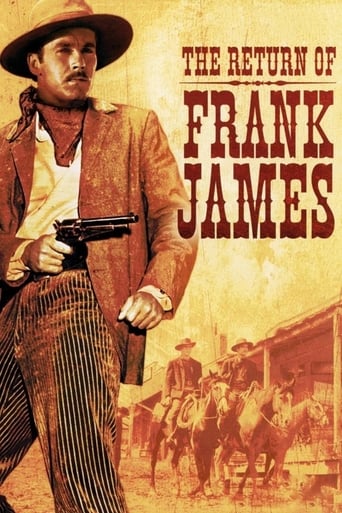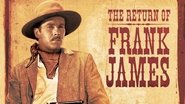hrkepler
'The Return of Frank James' is sequel to 'Jesse James' where Henry Fonda reprises his role as Frank. The film follows Frank's life after his brother Jesse is killed by the Ford brothers, and his chase of cowardice gunslingers. John Carradine (probably one of the greatest coward in Western history) again plays Bob Ford, and these two great players are supported by magnificent cast - Gene Tierney in her first film role, Henry Hull and Jackie Cooper.Visually striking (like one can expect from Lang movie), but substantially shallow, and historically incorrect, but whole lot of fun. This film is probably one of the best examples of mindless popcorn movies of 1940's. But it also proved that lighthearted westerns were not Fritz Lang's strongest genre.
georgewilliamnoble
The history here is as high wide and as fantastically inaccurate as the best screen writers in old Hollywood could invent. In it's day it was a sequel to the previous years big hit, the glossy biopic western "Jesse James", back by public demand too was that superb statue of dignified righteousness the legendary Henry Fonda reprising his role as the famous outlaw's brother "Frank James" and most excellent he is to in the pictures starring role. The movie is completely fictitious other than with the odd detail, such as the Fords really did reenact the famous killing on the stage. This is from the golden era of the Hollywood production machine and production values are simply superb, glorious technicolor, fabulous outdoor hard riding action, as with all films of the era the story is framed to please everyone, so there is the royal side kick the token beautiful woman given a sizeable part to please the woman's picture market, and some whimsy good humour, added to give the film wider appeal. Yes there something for everyone, including fans of the western gender. It is dated to watch today, in interesting ways, the casual racism most striking along with heavy racial stereo typing, but also in the use of hobby horse riders in needless close ups during hard riding chase sequences, these do grind a little but overall this is a very polished and expertly constructed movie that is shamelessly romantic not just of the old wild west era but of the Southern cause as well, all helm-ed expertly by the Austrian-Hungarian exile Fritz Lang who certainly knew how to deliver a good movie, In all this is a very solid entertainment and a great example of the Hollywood studio system of long ago.
johnnyboyz
The Return of Frank James is the sequel I rather annoyingly discovered was as such to the previous year's 'Jesse James', the film ending up as quite the enjoyable, subversive little western drama; a film with a good eye on the closer, more intimate notions of people coexisting and becoming both rather fond and rather influenced by both those around them as well as particular ways of life amidst this broadly told tale of peril through the hostile terrains of the west. It is a revenge film of sorts, a revenge film about an individual we're coerced into rather liking who is the bandit brother of a man recently murdered out to get even with two other brothers whom we're invited to dislike through their cowardice and hunger for fame. The film is ultimately the revising of that titular Frank James, brother to infamous Old West bandit Jesse; the likes of whom we observe murdered in the opening scene: quietly, innocently and whilst in his own house. It is a film revising of what faceless image the man has through a number of performances within the performance, delivered through an array of rather gripping dramatic set pieces and chance scenes that encompasses a fitting sub-plot of a newspaper company trying to eke out the truth of the matter in what is a reoccurring notion of getting to grips with the reality of an issue.Frank, Henry Fonda repressing his role, is in a state of existing having long since fled that life of stage robberies and terror when he hears of his brother's death. He's both living and working both peacefully and anonymously on a ranch with that of a coloured live-in assistant named Pinky (Whitman) as well as a young Caucasian named Clem (Cooper); guns seemingly hung up for good and even going out of his way now to drink natural spring water, in what is a perfect, even homely, finding of one's self at peace with his array of ethnic friends on an upstanding locale of a farm. Trouble, though, rears up and threatens to quell this haven-like existence; news filtering through of that of Jesse's death by the brothers Bob (Carradine) and Charlie (Tannen) Ford as well as their consequent pardon near enough enraging Frank to tank to his piles of hay so as to untangle his firearms wrapped neatly in a blood red handkerchief naturally coloured that way. Clem, allured by Frank's energy and anger in what are the beginnings of a particular sub-text, cannot wait to tag along with Frank to help him do his dirty-work of wrecking a retribution, although is pushed back and told to maintain the ranch by a cautious James. Fearing missing out, he follows on anyway.Frank's eventual allies arrive in the form of a press house owning journalist named Rufus Cobb (Hull), a Major turned journalist and printer, who bounces out of his offices and bounds down the street accepting and distributing his fairly well-mannered will as he asks after people and their relatives, generally instilling a sense that he knows most of those in town. When the time comes to bond with those in a saloon, he, where everyone else turns away, embraces or indeed draws attention onto those Ford brothers occupying the same place. Tossed in for good measure is the refreshing presence of Gene Tierney, here playing an out-of-towner named Eleanor Stone; a fellow journalist oh-so-desperately wanting to be accepted as such who is here looking to cover events and rejects her newspaper owning father's desire for her respective domesticisation in the form of a life as someone's housewife. James gets wind of the Ford's apparent heading out to the West, a trek which he dutifully begins so as to find them; the film's nucleus one unfolding within a filmic world wrought with frayed morals beginning with the untimely shooting of an individual in their home without them able to defend themselves and the extending of that to a gentleman forcing himself out of the more morally inclined lifestyle he has carved out so as to essentially hunt and kill two men. The director, the German Fritz Lang here operating in Hollywood with their star and studio systems having fled Europe out of running afoul of the Nazi's, constructs that of a faceless persona of the titular lead within the film through demonised public displays of show and upsets the balance by covering Frank as methodically and in the rounded manner he does.Peppering proceedings, and keeping in sync with that notion reconstructing or deconstructing a specific male character, Clem and his affection towards Frank sees him desire Frank to keep on a narrower path of violence and retribution; Clem admiring Frank as this hard-bodied, no nonsense bandit whom, upon being told he may not join him on the vendetta, gazes frustratingly at the man riding off to wage a one-man war. Later, plot development arise which threaten to see Tierney's journalist come between he and Frank, something that does not go down well with Clem inferring his homoerotic tie to the man Clem has. Harking back to Andrew Dominik's 2007 film, The Assassination of Jesse James by the Coward Robert Ford, we observe a similarly themed notion of becoming preoccupied with that of one of the James brothers; a sense of both idolisation or homoeroticism in regards to a bandit or a life of banditry, the likes of which was executed methodically there and is done so here in a cutting, efficient manner that is difficult to dislike.
MartinHafer
You should know before I go further that I have a strong prejudice against movies about the James Brothers and other 'heroic' criminals of the old west. Much of it is because they are bad history--making very minor characters far more important and heroic than they really were. Second, the studios almost always play fast and loose with the facts--something that makes history teachers like me have migraines.Why, then did I bother to see this film if I assumed I'd hate it? Well, it was directed by Fritz Lang--that's enough reason to see it. But it also stars Henry Fonda--and I'd watch him in anything.This film begins around the same time Jesse James was killed. It concerns his brother, Frank, and his actions following this death. Unfortunately, most of what you see never actually occurred--and Frank played no part in the deaths of the Ford Brothers--none. In fact, Frank gave himself up, was tried for some of his crimes (and acquitted) and retired to a relatively normal life. 'Frankly', I'd love to see a film about this--about the many odd jobs he did and the things he did after retirement--but I also doubt if the public would really care! I guess the truth just isn't very interesting in most cases.So, it's obvious that the plot was almost complete crap. What did I think about the film otherwise? Well, it was pretty to see--being in Technicolor. And Fonda's performance was nice--as usual. In fact the entire film is competent--just nearly all wrong! This actually makes one scene in the movie VERY ironic--and funny. Frank is enjoying a play when suddenly out come two actors pretending to be him and Jesse--and, naturally, the two actors are doing things the James' never did! I'm pretty sure the studio didn't see this as ironic or funny.By the way, at the 41 minute mark you see a couple horses make some horrifically bad falls. Sadly, to get this wonderful effect, the studios would actually use trip wires (like piano wire) to make the horses fall--and often the horses would break their legs and need to be euthanized! Fortunately this practice was later abandoned when bad publicity for this cruel thing brought this to light.





